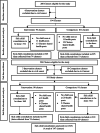Quality of sick child management by health extension workers: role of a complex improvement intervention
- PMID: 36797722
- PMCID: PMC9933397
- DOI: 10.1186/s12913-023-09131-1
Quality of sick child management by health extension workers: role of a complex improvement intervention
Abstract
Background: Despite the expansion of the Integrated Community Case Management services for childhood illness, quality and utilization of services have remained low. To address the problem, the Government of Ethiopia introduced a complex intervention that included community engagement, capacity building of health workers and enhanced district-level ownership of sick child management. We examined whether this complex intervention was associated with improved management of sick children by health extension workers.
Methods: The study was conducted in four Ethiopian regions. A baseline survey was conducted in 26 intervention and 26 comparison districts from December 2016 to February 2017, followed by an end-line survey 24 months later. We observed health extension workers' consultations of sick 2-59 months old children. The analysis has evaluated if children with pneumonia, diarrhoea and malnutrition were assessed, classified and treated according to guidelines, and included difference-in-difference analyses.
Results: We observed 1325 consultations of sick children. At baseline, 86% of the sick children with cough in the intervention areas and 85% in comparison areas were assessed according to the guidelines, without any change at end-line associated with the intervention (difference-in-difference = -21%, p = 0.55). Sixty-two percent of children were assessed for dehydration at baseline in intervention and 47% in comparison areas, with no improvement associated with the intervention. Similarly, 87% of sick children in intervention and 91% in comparison areas were assessed for malnutrition, with no change over time associated with the intervention (difference-in-difference = 5%, p = 0.16). Appropriate pneumonia treatment with antibiotics declined and diarrhea treatment increased in both areas. Half of the malnourished children received ready-to-use therapeutic foods without any improvement associated with the intervention.
Conclusion: The intervention was not associated with improved quality of the health extension workers' management of sick children. The lack of association may be linked to low fidelity in the implementation of the intervention. Our findings suggest that training healthcare providers without continued clinical mentoring and support does not improve the quality of care. Community-based programs can be strengthened by ensuring high coverage and continued clinical mentorships, supportive supervision, and supply of medicines and other essential commodities.
Trial registration number: ISRCTN12040912, retrospectively registered on 19/12/ 2017.
Keywords: Complex intervention; Ethiopia; Health extension workers; Quality of clinical care; Sick children.
© 2023. The Author(s).
Conflict of interest statement
The authors declare no competing interests.
Figures
Similar articles
-
Association between a complex community intervention and quality of health extension workers' performance to correctly classify common childhood illnesses in four regions of Ethiopia.PLoS One. 2021 Mar 12;16(3):e0247474. doi: 10.1371/journal.pone.0247474. eCollection 2021. PLoS One. 2021. PMID: 33711024 Free PMC article.
-
Implementation status, drivers and barriers to the sick children quality of care improving interventions in the Oromia region, Ethiopia: case study design.BMC Health Serv Res. 2025 May 16;25(1):710. doi: 10.1186/s12913-025-12863-x. BMC Health Serv Res. 2025. PMID: 40380265 Free PMC article.
-
Does a complex intervention targeting communities, health facilities and district health managers increase the utilisation of community-based child health services? A before and after study in intervention and comparison areas of Ethiopia.BMJ Open. 2020 Sep 15;10(9):e040868. doi: 10.1136/bmjopen-2020-040868. BMJ Open. 2020. PMID: 32933966 Free PMC article.
-
Integrated community case management of childhood illness in low- and middle-income countries.Cochrane Database Syst Rev. 2021 Feb 10;2(2):CD012882. doi: 10.1002/14651858.CD012882.pub2. Cochrane Database Syst Rev. 2021. PMID: 33565123 Free PMC article.
-
Integrated management of childhood illness: a review of the Ethiopian experience and prospects for child health.Ethiop Med J. 2002 Apr;40(2):187-201. Ethiop Med J. 2002. PMID: 12240581 Review.
Cited by
-
Strengthening implementation of integrated care for small and nutritionally at-risk infants under six months and their mothers: Pre-trial feasibility study.Matern Child Nutr. 2025 Jan;21(1):e13749. doi: 10.1111/mcn.13749. Epub 2024 Oct 21. Matern Child Nutr. 2025. PMID: 39431635 Free PMC article.
-
Capacity-building interventions for health extension workers in Ethiopia: A scoping review.PLoS One. 2025 Jan 13;20(1):e0317198. doi: 10.1371/journal.pone.0317198. eCollection 2025. PLoS One. 2025. PMID: 39804840 Free PMC article.
References
-
- Qazi S, Aboubaker S, MacLean R, Fontaine O, Mantel C, Goodman T, et al. Ending preventable child deaths from pneumonia and diarrhoea by 2025. Development of the integrated Global Action Plan for the Prevention and Control of Pneumonia and Diarrhoea. Arch Dis Child. 2015;100(Suppl 1):S23 LP–S28. doi: 10.1136/archdischild-2013-305429. - DOI - PubMed
-
- UNICEF . One is too many: Ending child deaths from pneumonia and diarrhoea. 2016.
-
- World Health Organization . Key facts. Children: improving survival and wellbeing. 2019.
-
- UNICEF . UNICEF DATA: Monitoring the situation of children amd women. 2019.
MeSH terms
Grants and funding
- INV-009691/GATES/Bill & Melinda Gates Foundation/United States
- INV-009691/GATES/Bill & Melinda Gates Foundation/United States
- INV-009691/GATES/Bill & Melinda Gates Foundation/United States
- INV-009691/GATES/Bill & Melinda Gates Foundation/United States
- INV-009691/GATES/Bill & Melinda Gates Foundation/United States
LinkOut - more resources
Full Text Sources
Medical



